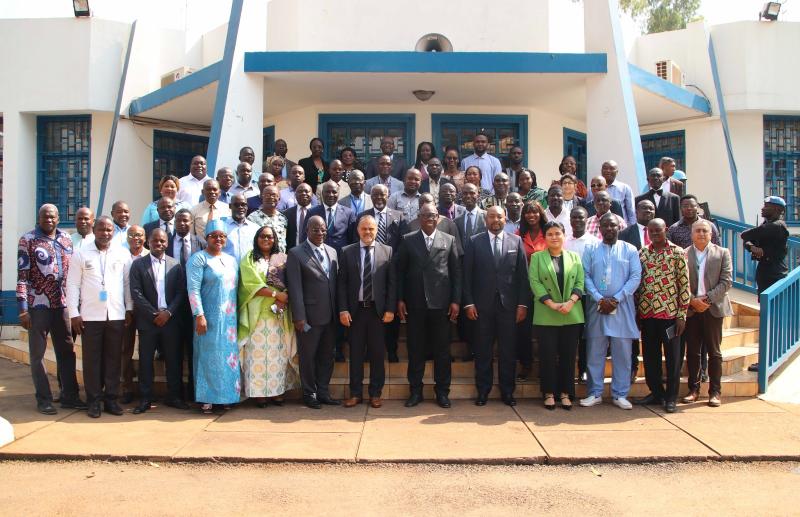

At a high-level meeting, CAFI and the Central African Republic (CAR) agreed to launch a $10 million call for expressions of interest for a pilot project, and a grant for the UNDP to support the government in integrating forest protection into the country's National Development Plan.
The Prime Minister of the Central African Republic, Félix Moloua, and CAFI’s Executive Board held a high-level meeting on February 5th of this year to strengthen the partnership, and mark the entrance of the partnership’s investment phase with an allocation of $10 million.
A call for expressions of interest (EoI) will be launched in 2024 to finance a pilot project identified in the country's National Investment Framework.
A $600,000 grant will be allocated to the United Nations Development Programme (UNDP) to help ministries integrate climate and forestry issues into the National Development Plan (NDP), and to support the country in its dialogue with CAFI.
H.E. Prime Minister Félix Moloua of the Central African Republic (CAR), together with H.E. Minister of the Economy, Planning and International Cooperation Sylvain Maliko and H.E. the Minister of Finance and Budget Hervé Ndoba, and H.E. Minister of Environment Thierry Kamach met on February 5, 2024 with the Ambassador of the United Kingdom, the Deputy Director of NICFI of Norway, the Director of Global Affairs at the French Ministry of Europe and Foreign Affairs and a representative from the Embassy of the Netherlands, in the presence of the UNDP Resident Representative in CAR, to renew their joint commitment, via the Central African Forest Initiative (CAFI), to work together to preserve the country's forests and biodiversity, and improve the living conditions of its 6.1 million inhabitants.
H.E. Prime Minister Félix Moloua expressed his wish to develop a closer partnership with CAFI, particularly in view of the challenges facing Central Africa: "I would like to thank CAFI for its interest in the region and for its availability to help Central African countries conserve the forests of the Congo Basin," declared His Excellency. "If these programmes to protect the forests did not exist, the negative impact would be enormous, for us and for the entire world."
In the presence of several authorities from his Government, the Prime Minister indicated the country's desire to designate the environment, climate and therefore the preservation of forest as a central axis of its future National Development Plan 2024-2029, a plan that the country hopes to validate in March 2024.
The UK's Ambassador to the DRC, Alyson King, welcomed this commitment and indicated CAFI's commitment to supporting the CAR by announcing a joint interest in financing a pilot project proposed in the country's National Investment Framework (NIF), following the launch of an EoI, launched during 2024.
The partners also agreed to a preparatory grant of $600,000, implemented by the UNDP, which will support the integration of climate and forest concerns into the country's National Development Plan, as well as the government's efforts to identify a number of key measures to preserve forest cover.
In its decision, the CAFI Executive Board encouraged the establishment of coordination mechanisms to ensure efficiency and inclusiveness in the development of the first investment projects. In this regard, H.E. Sylvain Maliko, Minister of Economy, Planning and Cooperation, underlined the "full availability of his Ministry to work in synergy with other Ministries" and all stakeholders to achieve their objectives.
The National REDD+ Investment Framework, finalized in 2019 as part of the partnership with CAFI and with the support of the French Development Agency (AFD), had established itself as a crucial first step in the Central African Republic's forest protection efforts. In his speech, Finance and Budget Minister Hervé Ndoba expressed his satisfaction with the partnership's recent progress, notably through the two feasibility studies concluded in 2023. He spoke of the need to effectively achieve tangible results in the new investment phase that opened today, in order to ensure continued support and sustainable financing – via carbon finance, for example – to reinforce the Government's resilience and poverty reduction efforts.
A landlocked country with an area slightly smaller than that of France, the Central African Republic has 28.3 million hectares of forest, covering 45% of its territory, with around 36% of dense forest and a significant proportion of tropical rainforest. According to the World Bank's first Poverty Assessment Report for CAR, published at the end of 2023, CAR has the 5th highest poverty rate in the world, with almost 70% of the country's population living in extreme poverty.
Beyond this, CAR represents a frontier between the "heart" of the Congo forests and other African biospheres. The Central African Republic is engaged in the transition from humanitarian aid to development aid, and in a process of decentralization, reinforced by the signing of the Political Agreement for Peace and Reconciliation. The implementation of REDD+ will support these processes, while ensuring the sustainable management of land and forest resources.
CAFI has been supporting CAR since 2019 in its development vision, which prioritizes decentralization, including land tenure and land use planning, sustainable forest management, agricultural transition and transparency in the mining sector. A first preparatory grant from CAFI enabled the Central African Republic to develop its REDD+ National Investment Framework (NIF), which was shared with CAFI by the Prime Minister in early 2020. A second preparatory grant focused on feasibility studies for the development of pilot projects identified in the NIF, culminating in February’s high-level meeting.
Originally published on www.cafi.org